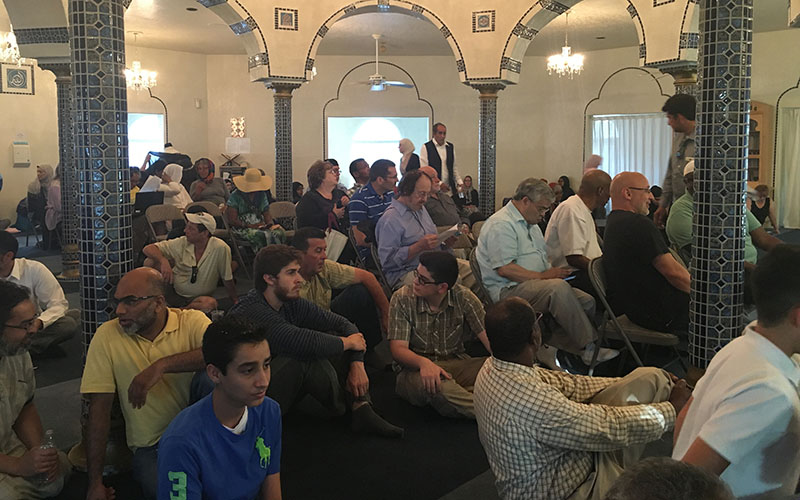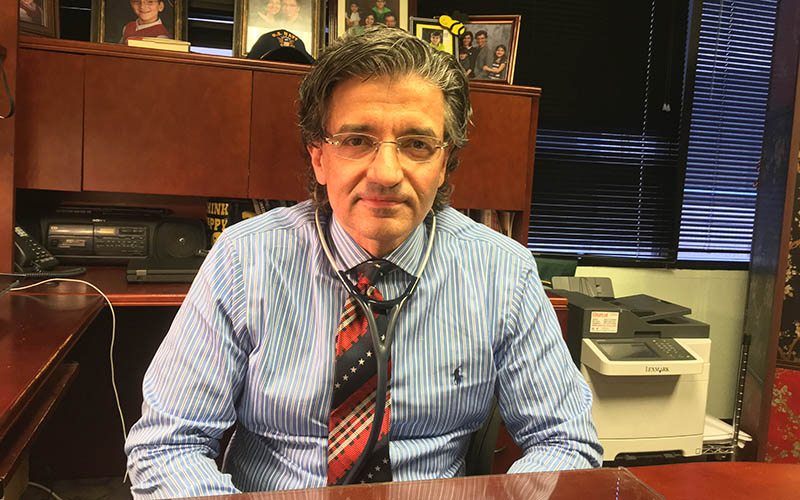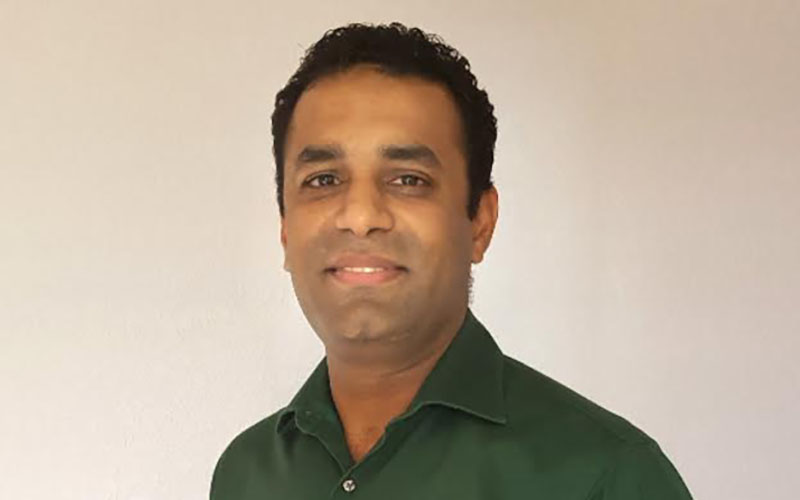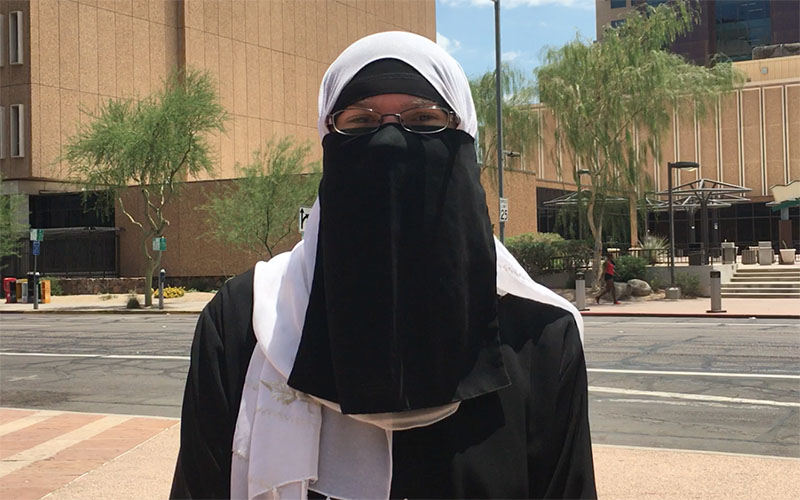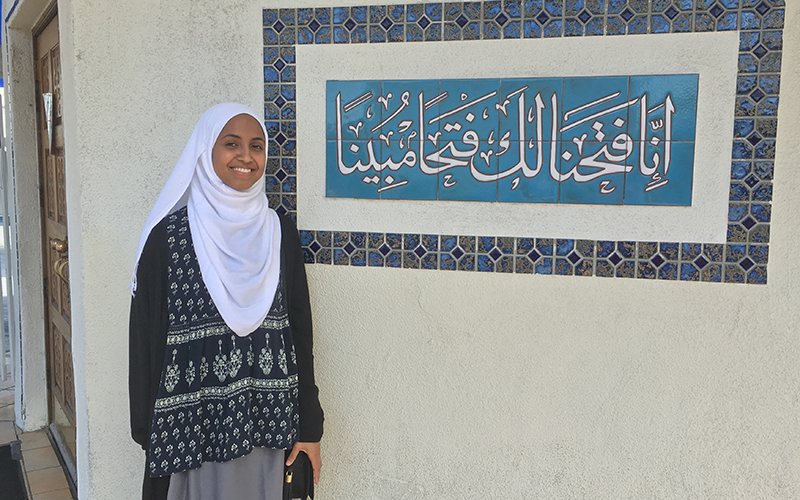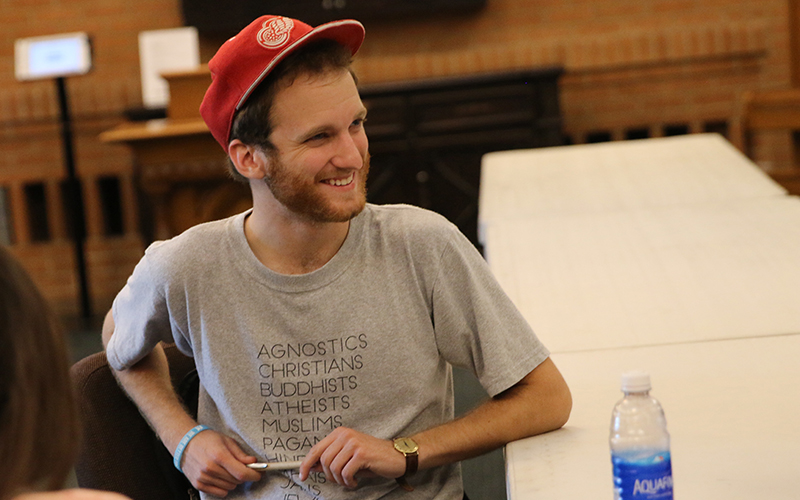- Slug: BC-CNS-Muslim Faces,1050 words
- Photos available (thumbnails, captions below)
By DAVID MARINO Jr.
Cronkite News
PHOENIX – Muslims in America have been burdened with a label of terrorism that colors others’ perceptions of Islam, a religion of peace and diverse followers, Arizona Muslims say.
“You can’t put Islam in a box,” said Johnny Martin, 23, a Mesa resident who converted to the faith two years ago.
Muslims in Arizona and across the nation are much like everyone else, say adherents. Brothers and sisters. The people who are in line at the grocery store and by the voting booth. Political conservatives and liberals, gay and straight, lifelong adherents to their religion and recent converts.
Arizona has seen its share of controversy over terrorism that has marked the world. In May 2015, Phoenix residents Elton Simpson and Nadir Soofi traveled to Garland, Texas, with the intention of attacking an art exhibit featuring images of the Prophet Muhammad. They were killed by a SWAT team before carrying out their plan. Another man from Tucson is on trial, accused of attempting to plan a terrorist attack.
Several Arizona Muslims pointed out that acts of violence carried out by the terrorist group ISIS do not reflect the peaceful teachings in the Quran.
“They certainly have the window dressing of Islam,” said Phoenix resident Sumayyah Dawud. “But their acts are absolutely un-Islamic.”
Misunderstandings grow out of such terrorist acts, Arizona Muslims lament.
“Many Americans are afraid of the unknown, they don’t know what Islam is,” said Hani Rahal, a leader in the Shia Muslim Al-Mahdi Benevolent Foundation, a Tempe-based Islamic religious and educational center.
Martin said someone can’t simply fill in a blank with their own idea of who Muslims are and what they believe.
“No one decides what Islam is and who the real Muslims are other than Allah,” Martin said.
Martin, who is bisexual, became public about his sexual identity after the Orlando, Florida, nightclub shooting, where 49 people, many who were gay and Latino, were shot to death.
“I mostly came out publicly just to be in solidarity with other folks within the LGBTQ community,” Martin said. “But also to bring an awareness to people who inhabit intersectional identities, because that is often forgotten, and people want to put everyone in a box.”
An estimated 50,000 to 60,000 Muslims live in Arizona – exact numbers are hard to come by – with each person shaped by similar and different experiences.
Misconceptions about Muslims
Imran Siddiqi is the head of the Arizona branch of the Council on American Islamic Relations, more popularly known as CAIR, a Muslim advocacy group with regional offices nationwide.
Siddiqi says that Arizona is a “melting pot,” where Muslims are largely welcomed.
However, he said that in his work with CAIR, he has received reports of discrimination from Arizonans two or three times a week. Most cases don’t even go reported.
Siddiqi described the May 2015 anti-Islam protest outside the Islamic Community Center of Phoenix as a “turning point” in Islamophobia in Arizona.
The protest, in response to the attack in Garland, Texas, drew more than 200 protesters, many of whom wore shirts and brandished signs berating Islam and Muslims.
Siddiqi was particularly alarmed about the number of protesters who were armed. He said the intersection of Islamophobia and gun culture is an issue facing Arizona, even though he said there hasn’t been a “huge swath” of hate crimes in the state.
Siddiqi said one of the biggest misconceptions about Islam, both in Arizona and nationwide, is that Islam is something “foreign” and new to America. He said about 20 percent of African slaves brought to America were Muslim.
“Muslims have been here as a part of America since day one,” Siddiqi said.
Muslims on the rise
The Pew Research Center estimates one percent of Arizona residents are Muslim. However, there is little to no data on other information, such as growth potential or other demographics about Muslims in Arizona.
Still, the 2015 Pew study provides a glimpse of the future. Pew estimates that by 2050, American Muslims will double to about two percent of the population. That would make them the second-largest religion in the United States, behind Christianity. (The group of people who are unaffiliated with any organized religion would still be larger than those who identify as Muslim.)
Leaning toward political diversity
Muslims, similar to other religious groups, have diverse political views but largely vote a Democratic ticket.
About 70 percent of Muslim Americans identify or lean toward the Democratic Party, while 11 percent favor the Republican Party, according to a 2011 Pew poll.
Mona Said’s face shines when speaking about former Democratic presidential candidate Bernie Sanders. She said she likes “everything” about him, especially how he is outside of the “normal political sphere.”
“He doesn’t have a secret agenda. He truly wants the best for everyone,” said Said, 19, a Phoenix resident.
But Zuhdi Jasser is a controversial, card-carrying conservative activist. The Scottsdale resident supports “family values,” the Second Amendment, a strong national defense and small government.
Jasser admits this has often put him in conflict with other Muslims in the Phoenix area, especially those who criticize American military policy abroad. He points to being uncomfortable when an imam criticized the American military presence in Iraq in the early 2000s.
“He’s free to have those foreign policy positions, I just don’t think it’s appropriate to do that at the mosque,” Jasser said.
Islam’s future in Arizona
Several Muslims said there are some glimmers of hope in how non-Muslims perceive Arizona adherents to Islam.
When Muhammad Ali died in Scottsdale in June, Said was pleased to see the respect that he received from the American public. She believes it briefly soothed relationships now that America was mourning an international icon who was “proudly Muslim.”
Umer Shahid, 32, of Tucson, hopes that by spreading the message of his Ahmadiyya faith, he can show the world that Islam is far separated from the brutality of ISIS and other terrorist groups.
Martin wants to bring together people of different faiths, including Muslims, Jews, Christians, as well as atheists, to better understand each others’ religious faiths. He ultimately seeks a more understanding world.
Siddiqi believes that the main way to fight against discrimination against Muslims is to educate others about Islam.
“Islamophobia comes from lack of knowledge,” Siddiqi said. “It’s easy to hate a Muslim when you’ve never met one before.”
Hani Rahal, 61
Where he lives: Gilbert
Who he is: Rahal, a Lebanese-American who was born a Muslim, is a member of the Shia sect, making him a minority among the largely Sunni Muslims in Arizona.
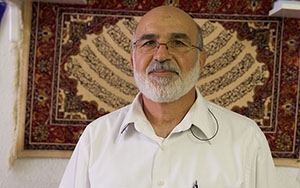 Hani Rahal, 61, of Gilbert, stands at the Al Mahdi Benevolent Foundation of Arizona in Tempe. (Photo by David Marino Jr./Cronkite News)
Hani Rahal, 61, of Gilbert, stands at the Al Mahdi Benevolent Foundation of Arizona in Tempe. (Photo by David Marino Jr./Cronkite News)
Rahal left Lebanon, where he was born, shortly before it descended into civil war in the 1970s. He attended Arizona State University in the 1980s, where he met his wife, who later converted to Shia Islam.
Since the late 1990s he has been a leader in the Al-Mahdi Foundation, a Shia Muslim group. Its headquarters in Tempe is a place of prayer and education.
Rahal speaks softly and calmly as he talks about the way he practices Islam. To Rahal, the Islam that the Prophet Muhammad brought was that of love, peace, passion and respect for other human beings, Muslim or not.
Why he is a Muslim: “I studied Islam, and I found out it’s the true words of God and, as a human being, we should worship God. That’s why I’m a Muslim.”
What Shia Islam means to him.
Zuhdi Jasser, 48
Where he lives: Scottsdale
Who he is: A member of the Sunni sect, Jasser is one of the most prominent Muslim members of the Republican Party.
Jasser, a doctor, is president of the American Islamic Forum for Democracy, which advocates for “separation of mosque and state.”
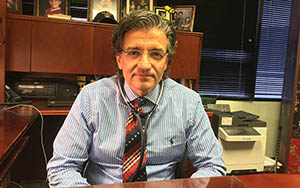 Zuhdi Jasser, 48, of Scottsdale, sits in the office of his medical practice in Phoenix. (Photo by David Marino Jr./Cronkite News)
Zuhdi Jasser, 48, of Scottsdale, sits in the office of his medical practice in Phoenix. (Photo by David Marino Jr./Cronkite News)
He occasionally appears as a conservative analyst on Fox News, and often spars with other Muslims in the Valley over his criticism of what he perceives as “Islamist” influence, with religion too intertwined with government policies. A spokesman for the Council on American Islamic Relations went as far as to call him a “sock puppet” for haters of Islam, saying he was an “enabler” of Islamophobia.
Jasser, otherwise calm and serious, got angry when asked about his critics. He called those who call him an Islamophobe “corrupt and dishonest,” and believes it is an attempt to silence his group’s ideology.
What Islam means to him: “Islam means that your soul is at peace when you’ve submitted to God. So, ultimately faithful Islam is related to doing everything possible to do the best that you can on this earth on a daily basis, and then you submit to God that your faith is in his hands.”
Zuhdi Jasser explains a favorite Quranic verse of his.
Umer Shahid, 32
Where he lives: Tucson
Who he is: Shahid is a member of the Ahmadiyya sect, neither Sunni nor Shia. Ahmadiyya Muslims number about 20 million in the world and have a small presence in Arizona.
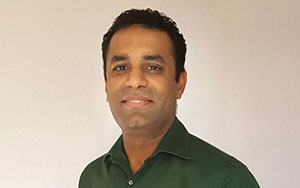 Umar Shahid, 32, is a member of the Ahmadiyya Muslim Community in Tucson. (Photo courtesy of Umar Shahid)
Umar Shahid, 32, is a member of the Ahmadiyya Muslim Community in Tucson. (Photo courtesy of Umar Shahid)
Ahmadiyya is an Islamic religious movement that began near the end of the 19th century in British India. Ahmadiyya Muslims follow conventional Islamic doctrine but diverge in their belief in the life and teachings of Mirza Ghulam Ahmad, who they see as the promised Messiah as well as the second coming of Jesus Christ.
Shahid believes in the Ahmadiyya goal of spreading what “true Islam” is to the masses now more than ever. He tries the best to do this through communal work in Tucson, including going to local book conventions to introduce Ahmadiyya to non-Muslims.
Why he is a Muslim: “The meaning of Islam is peace, and our religion also teaches us to talk about peace and work for peace, and that’s about it.”
Umer Shahid explains support, opposition and duty.
Sumayyah Dawud, 31
Where she lives: Phoenix
Who she is: Sumayyah Dawud is a local activist who converted to Islam three years ago, and said that she “leans Sunni.” Dawud sees her activism and her faith as inseparable, believing that within Islam there is a strong belief in social justice.
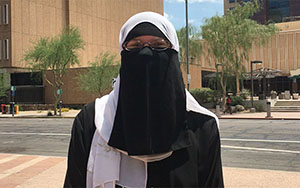 Sumayyah Dawud, 31, of Phoenix, stands at Cesar Chavez Plaza in Phoenix, where she often goes for protests. (Photo by David Marino Jr./Cronkite News)
Sumayyah Dawud, 31, of Phoenix, stands at Cesar Chavez Plaza in Phoenix, where she often goes for protests. (Photo by David Marino Jr./Cronkite News)
She shows this with her activism, which has included protesting against Islamophobia, favoring transgender and LGBT rights, supporting Palestinian rights and fighting police brutality and on behalf of refugees.
Dawud shows emotions through her glasses-adorned eyes, as she wears the full niqab over her face, one indication of her religious conservatism.
In 2015 Dawud, who is transgender, made local and national headlines from her dispute with the Islamic Community Center of Tempe, whose leaders asked for medical records from Dawud proving that she was biologically female. She said because of the reactions she often gets when attending mosques, which include complaints and harassment, she tends to do most of her prayer at home.
Why she is a Muslim: “Islam has a simplicity to it. It just really clicked to me. When I started reading the Quran, it’s very much like an instruction manual for life, where it’s like, if you do this, if you have these beliefs and do these good deeds, you’re on the path to a reward.”
Sumayyah Dawud explains why she wears the niqab.
Mona Said, 19
Where she lives: Phoenix
Who she is: Said, an Arizona State University student who was born and raised Sunni, is of Somali descent.
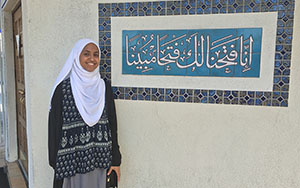 Mona Said, 19, of Phoenix, stands in front of the Islamic Community Center of Tempe (Photo by David Marino Jr./Cronkite News)
Mona Said, 19, of Phoenix, stands in front of the Islamic Community Center of Tempe (Photo by David Marino Jr./Cronkite News)
Her parents fled Somalia in the 1990s for the United States. Born in California, Said has lived in Seattle, Washington and Egypt.
Said is the newly appointed president of the Muslim Student Association of ASU. She frowned as she talked about what she believes is a recent escalation of Islamophobia in the United States. She said Republican presidential candidate Donald Trump is at least partially responsible.
“I just want to sit with him and tell him it’s going to be all right, and Muslims aren’t that bad,” Said said.
Why she is a Muslim: “I’ve always felt like everything in my life has always been changing, like my family, the amount of times that I’ve moved, and all that, but then the only stable thing, the only that I could always lean on, was my religion.”
Mona Said talks about some of the negative reactions she gets.
Johnny Martin, 23
Where he lives: Mesa
Who he is: Martin, an Arizona State University student who converted to Islam about two years ago, is a self-described interfaith activist.
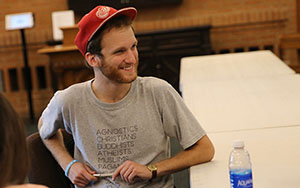 Johnny Martin, 23, of Mesa, smiles during a meeting of his interfaith group at the Central United Methodist Church in Phoenix. (Photo by David Marino Jr./Cronkite News)
Johnny Martin, 23, of Mesa, smiles during a meeting of his interfaith group at the Central United Methodist Church in Phoenix. (Photo by David Marino Jr./Cronkite News)
He can often be seen holding up a large sign for his interfaith group Sun Devils Are Better Together, which has sought to bring together people of different faiths and “engage across lines of difference” since it was founded two years ago.
Often sporting a baby blue baseball cap with “Allah” inscribed in Arabic, Martin has a calm and positive demeanor as he speaks about his interfaith work.
Martin said that coming out as bisexual in the wake of the Orlando attacks has led to more media attention, including an appearance on Arizona Horizon.
Why he is a Muslim: “I feel that it’s the right thing to do to be Muslim for me, since God, or Allah, revealed herself to me through the Quran and through the tradition of Islam. It’s important for me to maintain my relationship with my faith, my creator and with my tradition.”
Johnny Martin talks about his intersectional identity.
Harvey Martin, 36
Where he lives: Yuma
Who he is: Harvey Martin didn’t know a whole lot about Islam until he went on a date in Yuma, where he was stationed with the Marine Corps.
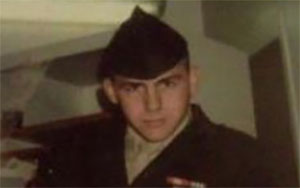 Harvey Martin, 36, describes the Yuma Muslim community as small. (Photo courtesy of the Arizona Secretary of State website)
Harvey Martin, 36, describes the Yuma Muslim community as small. (Photo courtesy of the Arizona Secretary of State website)
Martin and his now-wife Kaoutar Burrell, a Moroccan-American Arizona native, went to a restaurant, and she requested that he not eat pork products in front of her because pork is haram (prohibited) in Islam. They later went to a local mosque, and he learned more and more about Islam before he converted to the religion about fourteen years ago.
Martin’s Southern accent, from roots in Baton Rouge, Louisiana, is audible as he talks about what Islam means to him. He is also currently running for Congress in Arizona’s 3rd District, which he describes as a “grassroots” campaign being done on Twitter and Facebook.
Martin remained in Yuma after his deployment, and described the Yuma Muslim community as small, “about 100 families,” but very tightly knit and always willing to help one another out.
Why he is a Muslim: “To be a Muslim you have to have good character, be nice to your neighbors, just like the Bible says. We’re not so different from Christians and Jewish people. The basic concepts are the same in all the religions, charity, do unto others, it’s the same for Islam.”
Harvey Martin explains the misunderstanding of “Jihad.”
^__=
The Islamic Community Center of Tempe, one of the largest mosques in Arizona. (Photo by David Marino Jr./Cronkite News)
People sit during an event at the Islamic Community Center of Tempe. (Photo by David Marino Jr./Cronkite News)
Hani Rahal, 61, of Gilbert, stands at the Al Mahdi Benevolent Foundation of Arizona in Tempe. (Photo by David Marino Jr./Cronkite News)
Zuhdi Jasser, 48, of Scottsdale, sits in the office of his medical practice in Phoenix. (Photo by David Marino Jr./Cronkite News)
Umar Shahid, 32, is a member of the Ahmadiyya Muslim Community in Tucson. (Photo courtesy of Umar Shahid)
Sumayyah Dawud, 31, of Phoenix, stands at Cesar Chavez Plaza in Phoenix, where she often goes for protests. (Photo by David Marino Jr./Cronkite News)
Mona Said, 19, of Phoenix, stands in front of the Islamic Community Center of Tempe (Photo by David Marino Jr./Cronkite News)
Johnny Martin, 23, of Mesa, smiles during a meeting of his interfaith group at the Central United Methodist Church in Phoenix. (Photo by David Marino Jr./Cronkite News)

